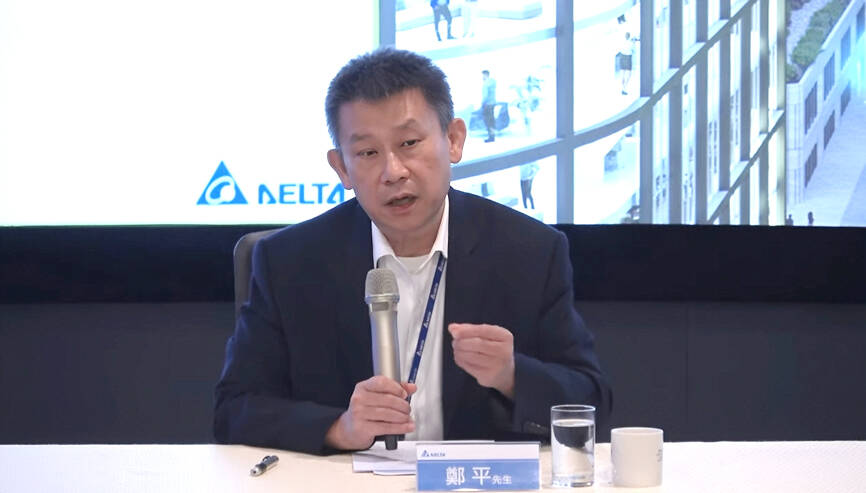Delta Electronics Inc (台達電) yesterday said revenue in the second half of this year is expected to surpass the first half, on the back of continued demand for power supply units and heat dissipation products for artificial intelligence (AI) servers.
Most large-scale cloud service providers continue to maintain high capital expenditures, lending support to the power supply unit business, Delta chairman Ping Cheng (鄭平) said.
AI-related products are expected to account for a larger share of total revenue in the second half, Cheng said, adding that AI-related power supply units made up 22 percent of second-quarter revenue, while liquid cooling products contributed 5 percent.

Photo courtesy of Delta Electronics Co
Delta vice president Lanford Liu (劉亮甫) said that power racks have become a design trend and a shift to those solutions appears likely, as Nvidia is expected to launch a new platform in 2027, although much depends on silicon design progress.
The company is activating three new factories in Thailand, with another three under construction, Cheng said.
As US tariffs for products made in Thailand remained uncertain, with a rate set at 36 percent, Delta would not further expand its capacity there if the rate stays the same, he said.
Meanwhile, as the supply chain for its liquid-to-air cooling systems is still primarily based in China, relocating production could pose capacity challenges, Cheng said.
Most modules, including heat-dissipating fans and fins, are assembled in Taiwan, he added.
Delta’s second-quarter revenue rose 19.91 percent year-on-year to NT$124.04 billion (US$4.15 billion), a record high for a single quarter, but was still below expectations due to the sharp appreciation of the New Taiwan dollar, company investor relations manager Rodney Liu (劉致遠) said.
Power electronics products accounted for 52 percent of Delta’s total sales in the second quarter, followed by infrastructure products at 28 percent, automation devices at 11 percent and mobility applications at 9 percent.
In the second quarter, Delta’s net profit reached NT$13.95 billion, with a record earnings per share of NT$5.37, driven by growing demand for AI power supply products and heat dissipation components, despite foreign exchange losses of NT$180 million in the quarter, Liu said.
Gross margin rose 1.4 percentage points year-on-year to 35.5 percent, while gross profit reached NT$44 billion, up 25 percent from a year earlier, also the highest on record.
Gross margin for the second half is expected to be similar to last year’s level, with AI-related products continuing to outperform other segments, cooling products to remain modest and mobility products to fall from a year earlier, Cheng said.

JITTERS: Nexperia has a 20 percent market share for chips powering simpler features such as window controls, and changing supply chains could take years European carmakers are looking into ways to scratch components made with parts from China, spooked by deepening geopolitical spats playing out through chipmaker Nexperia BV and Beijing’s export controls on rare earths. To protect operations from trade ructions, several automakers are pushing major suppliers to find permanent alternatives to Chinese semiconductors, people familiar with the matter said. The industry is considering broader changes to its supply chain to adapt to shifting geopolitics, Europe’s main suppliers lobby CLEPA head Matthias Zink said. “We had some indications already — questions like: ‘How can you supply me without this dependency on China?’” Zink, who also

The number of Taiwanese working in the US rose to a record high of 137,000 last year, driven largely by Taiwan Semiconductor Manufacturing Co’s (TSMC, 台積電) rapid overseas expansion, according to government data released yesterday. A total of 666,000 Taiwanese nationals were employed abroad last year, an increase of 45,000 from 2023 and the highest level since the COVID-19 pandemic, data from the Directorate-General of Budget, Accounting and Statistics (DGBAS) showed. Overseas employment had steadily increased between 2009 and 2019, peaking at 739,000, before plunging to 319,000 in 2021 amid US-China trade tensions, global supply chain shifts, reshoring by Taiwanese companies and

Taiwan Semiconductor Manufacturing Co (TSMC, 台積電) received about NT$147 billion (US$4.71 billion) in subsidies from the US, Japanese, German and Chinese governments over the past two years for its global expansion. Financial data compiled by the world’s largest contract chipmaker showed the company secured NT$4.77 billion in subsidies from the governments in the third quarter, bringing the total for the first three quarters of the year to about NT$71.9 billion. Along with the NT$75.16 billion in financial aid TSMC received last year, the chipmaker obtained NT$147 billion in subsidies in almost two years, the data showed. The subsidies received by its subsidiaries —

OUTLOOK: Pat Gelsinger said he did not expect the heavy AI infrastructure investments by the major cloud service providers to cause an AI bubble to burst soon Building a resilient energy supply chain is crucial for Taiwan to develop artificial intelligence (AI) technology and grow its economy, former Intel Corp chief executive officer Pat Gelsinger said yesterday. Gelsinger, now a general partner at the US venture capital firm Playground Global LLC, was asked at a news conference in Taipei about his views on Taiwan’s hardware development and growing concern over an AI bubble. “Today, the greatest issue in Taiwan isn’t even in the software or in architecture. It is energy,” Gelsinger said. “You are not in the position to have a resilient energy supply chain, and that,